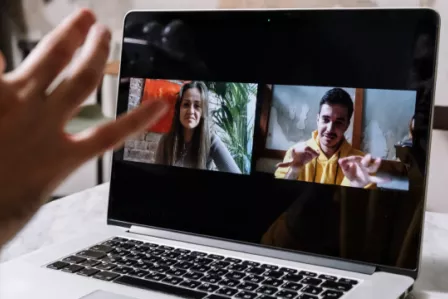Today, the Insafe network meets online for a focus group on the topic of children’s rights in relation to the digital environment, more particularly with regards to how policy in that field can be translated into practice.

This focus group will, first and foremost, provide members of the Insafe network of European Safer Internet Centres with an overview of recent EU and international developments of children’s rights in a digital world, in particular the United Nations Committee on the Rights of the Child’s General Comment 25 on children’s rights in relation to the digital environment and the EU Strategy on the Rights of the Child. This overview will be provided by Valerie Verdoodt, Postdoctoral Fellow at the London School of Economics (LSE) Department of Law and Affiliate Fellow at Ghent University, and Eva Lievens, Assistant Professor at the Faculty of Law and Criminology of Ghent University, in a session called “Making sense of children’s rights in a digital world”.
Another aim of this focus group is for the Insafe network to discuss the importance of meaningfully involving children and young people in policy development and implementation. The network will have the opportunity to discuss good practices in that field in a session called “Involving young people in age-appropriate child and youth consultations.”
This focus group is also an opportunity for members of the Insafe network to learn more about the upcoming European Commission consultation in relation to the Better Internet for Kids strategy, and the recently published 2030 Digital Compass: the European way for the Digital Decade, and discuss possible ways of getting involved.
Hans Martens, Insafe Network Coordinator, said: “In recent months, we have witnessed the adoption of a range of policy commitments – both at European and international levels – impacting children’s rights in the digital environment positively. The Insafe network of European Safer Internet Centres is now in a prime position to ensure, on the one hand, that these commitments become concrete realities in the everyday lives of all young Europeans and, on the other, that the views of children and young people from all ages and backgrounds are duly taken into account in the process. Therefore, we are very much looking forward to this focus group, which will enable the network to design a strategy to collect the views of young people and wider stakeholders in the most efficient and meaningful way.”
If you wish to learn more about the work of the Insafe network of Safer Internet Centres and other stakeholders in the field, visit the Better Internet for Kids (BIK) portal and subscribe to the quarterly BIK bulletin for news and resources on the latest trends and challenges online.
Today, the Insafe network meets online for a focus group on the topic of children’s rights in relation to the digital environment, more particularly with regards to how policy in that field can be translated into practice.

This focus group will, first and foremost, provide members of the Insafe network of European Safer Internet Centres with an overview of recent EU and international developments of children’s rights in a digital world, in particular the United Nations Committee on the Rights of the Child’s General Comment 25 on children’s rights in relation to the digital environment and the EU Strategy on the Rights of the Child. This overview will be provided by Valerie Verdoodt, Postdoctoral Fellow at the London School of Economics (LSE) Department of Law and Affiliate Fellow at Ghent University, and Eva Lievens, Assistant Professor at the Faculty of Law and Criminology of Ghent University, in a session called “Making sense of children’s rights in a digital world”.
Another aim of this focus group is for the Insafe network to discuss the importance of meaningfully involving children and young people in policy development and implementation. The network will have the opportunity to discuss good practices in that field in a session called “Involving young people in age-appropriate child and youth consultations.”
This focus group is also an opportunity for members of the Insafe network to learn more about the upcoming European Commission consultation in relation to the Better Internet for Kids strategy, and the recently published 2030 Digital Compass: the European way for the Digital Decade, and discuss possible ways of getting involved.
Hans Martens, Insafe Network Coordinator, said: “In recent months, we have witnessed the adoption of a range of policy commitments – both at European and international levels – impacting children’s rights in the digital environment positively. The Insafe network of European Safer Internet Centres is now in a prime position to ensure, on the one hand, that these commitments become concrete realities in the everyday lives of all young Europeans and, on the other, that the views of children and young people from all ages and backgrounds are duly taken into account in the process. Therefore, we are very much looking forward to this focus group, which will enable the network to design a strategy to collect the views of young people and wider stakeholders in the most efficient and meaningful way.”
If you wish to learn more about the work of the Insafe network of Safer Internet Centres and other stakeholders in the field, visit the Better Internet for Kids (BIK) portal and subscribe to the quarterly BIK bulletin for news and resources on the latest trends and challenges online.
- online respect Insafe
Related content
- < Previous article
- Next article >












